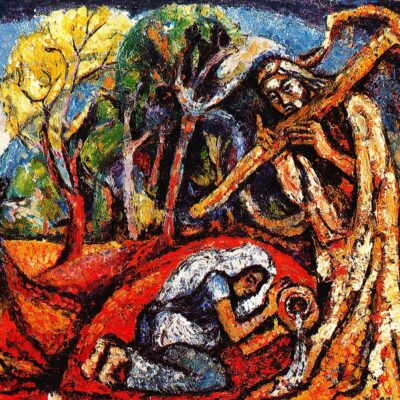The Last Sunday after Epiphany / Transfiguration Sunday
Leadership is important. A leader sets the tone and direction for others to follow. Leadership is rooted in identity, and is reflected not only in action or results but also in example and character.
The Bible is full of leaders, good, bad and indifferent. There are kings, judges, prophets and priests in the Hebrew Scriptures. Some are models of holiness and wisdom and others are bad shepherds who take advantage of those given into their care. All of them are human and flawed. Standing far above all others are Moses and Elijah. Moses is known as the great lawgiver and Elijah as the father of all the prophets, the one who will appear to announce the arrival of the Messiah.
Moses led the Israelites out of slavery in Egypt, through the Red Sea and into the wilderness for 40 years. On his ascent alone up the mountain, he was given the tablets with the 10 Commandments inscribed upon them. Proof of his encounter with the Holy One is that his face is glowing. This is the source of his authority, his close walk with God, and his obedience to God’s call and commandments.
He was far from perfect. Initially he was rejected by his Jewish siblings, not only because he had been raised in the Egyptian court, but also because he was a hot head and a murderer. When he used the staff of God’s authority to part the waters of the Red Sea and the pillar of fire and cloud went ahead of him to lead the people to safety, it was God’s power and leadership that guided him. During the many times when he got completely fed up by the grumbling and rebellion of the people, he had to be talked down from quitting both by God and by his father-in-law who gave him some good advice about delegating leadership responsibilities.
It was Moses who brought them all safely through to the edge of the Promised Land. But he never crossed over with them into it. He remained on a hill overlooking the Jordan River with the land filled with milk and honey on the other side. His lieutenant, Joshua succeeded him and was appointed by God to take the people across. Under Moses’s leadership the people stayed together, reached their destination, discovered their core values and ethics and pledged to live faithfully before God in their new circumstances. He is a great hero.
When Peter, James and John go up the mountain with Jesus where his entire being glows and he is transfigured, they also see the figures of Moses, the Lawgiver and Elijah, the prophet. Jesus is in company with their greatest leaders. It was a transcendent experience, an epiphany. They must have already felt special since Jesus had chosen them for this experience. And, in the presence of these iconic figures, they must have been utterly thrilled. They got to be close to these three great leaders. They overheard their conversation.
Immediately Peter lets Jesus know how good it is that they are present to witness this event. He wants to build dwellings for Moses, Elijah and Jesus in case they’re going to be meeting on a regular basis. And, of course, his three most faithful disciples will be there to control access to the buildings.
Before Jesus can answer, the cloud rolls in and overwhelms them. They are terrified when they hear a disembodied voice from the heavens speaking to them. All their pride at witnessing the transfiguration and their desire to memorialize it disappear. They are struck silent.
I have puzzled over this for years. What did Peter say that provoked such a dramatic response from the Holy One? How did he screw up this time? After all any fanboy would want to have a memento of his encounter with the famous! I wonder if at the heart of this issue is that Peter is equating Jesus with Moses and Elijah. He treats them as if they all have the same value, building three dwellings for these three leaders. After all, that’s what we do when we admire someone. We put them up on a pedestal. We want to enshrine them even if it means ignoring some of their faults and failures. We honor our heroes and gloss over their inevitable shortcomings.
But Jesus isn’t like Moses or Elijah. As God so powerfully proclaims, “This is my Son, My Chosen; listen to him!” Jesus isn’t just another great leader, teacher or prophet. He glows, not with the reflected glory of God but with the divine glory that is his very essence.
Here, on the final Sunday of the Season after Epiphany, we get the full force of the message that began with the star in the East. The child that was born in the stable at Bethlehem is the One who we also name “Wonderful, Counselor, Mighty God, Prince of Peace.” He is destined for the rising and falling of nations. At his baptism in the River Jordan the voice from heaven proclaimed, “You are my Son, the Beloved; with you I am well pleased.” And at his first miracle in Cana, he transformed water into wine as a sign of God’s abundance and kingdom of love.
Now at the Transfiguration we see him as he truly is, the Holy One of God, the Chosen. He is not just one amongst the great leaders of Israel. He alone is the Good Shepherd, who can gather up and care for all who have been given into his care. He is the Messiah who will save and deliver the people.
Already Jesus has begun to tell his closest followers that he is going on to Jerusalem where he will be taken, suffer, die and rise again. His leadership is one of service and sacrifice on behalf of all, even those who hate and persecute him. He is the embodiment of servant leadership and he commands that we who follow him, love as he loves. That means loving our neighbors as ourselves. It even means loving our enemies.
Leadership is service. Leadership is loving. And those of us who have caught a glimpse of God’s glory and revelation are called to share this responsibility. We lead with our tone and outlook. We lead in how we serve others, particularly the most vulnerable. We lead, not by putting ourselves first but by putting God and others in the primary position. We lead by example and by our character. We lead when we take seriously the commandments and values we have received from our Jewish and Christian ancestors in the faith.
We may not command thousands or even dozens, but God has called each of us into a position of leadership as fellow shepherds, as fishers of people, as ministers of the gospel. As Martin Luther King Jr. said,
“Everybody can be great…because anybody can serve. You do not have to have a college degree to serve. You do not have to make your subject and verb agree to serve. Most importantly, you only need a heart full of grace. A soul generated by love.”
Jesus wasn’t interested in building monuments to himself. In fact, after the transfiguration he goes down the mountain and immediately cares for a heartbroken, hopeless father and his son who is convulsing and frothing at the mouth. From the mountain top, he continues to Jerusalem where he will finally be lifted up and proclaimed as King of the Jews, but this time it will be on a cross as a sacrifice of love for the whole world. Amen.





